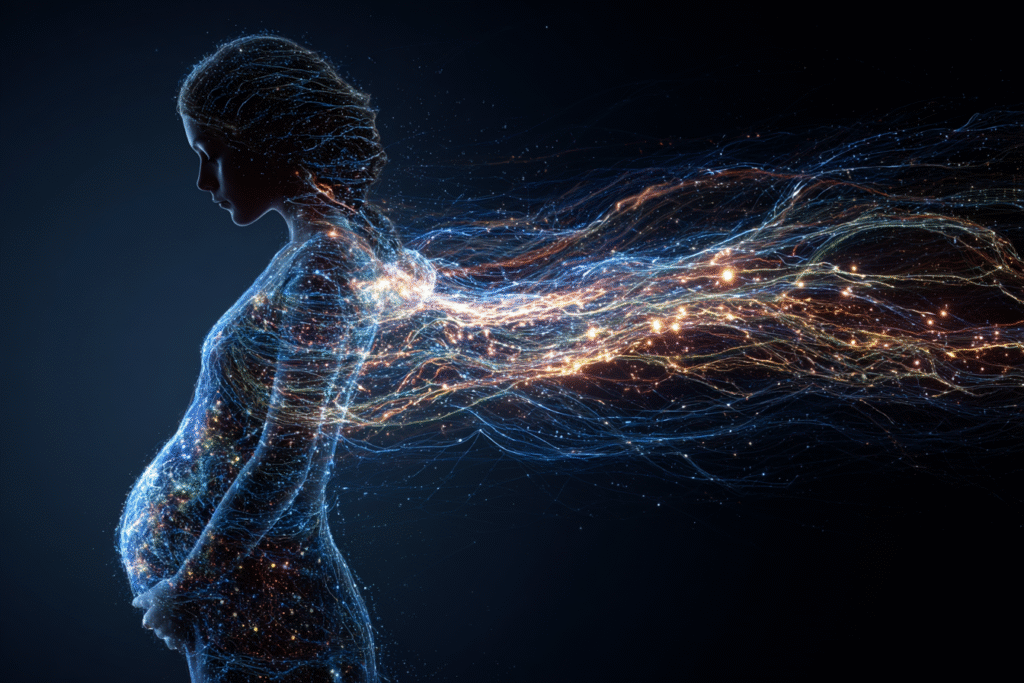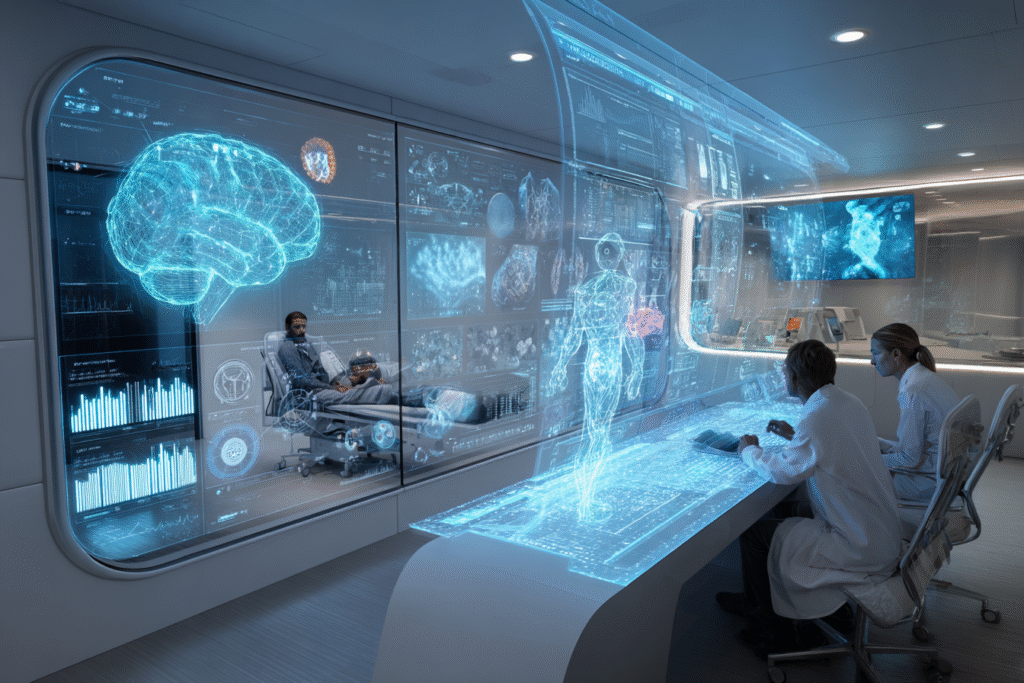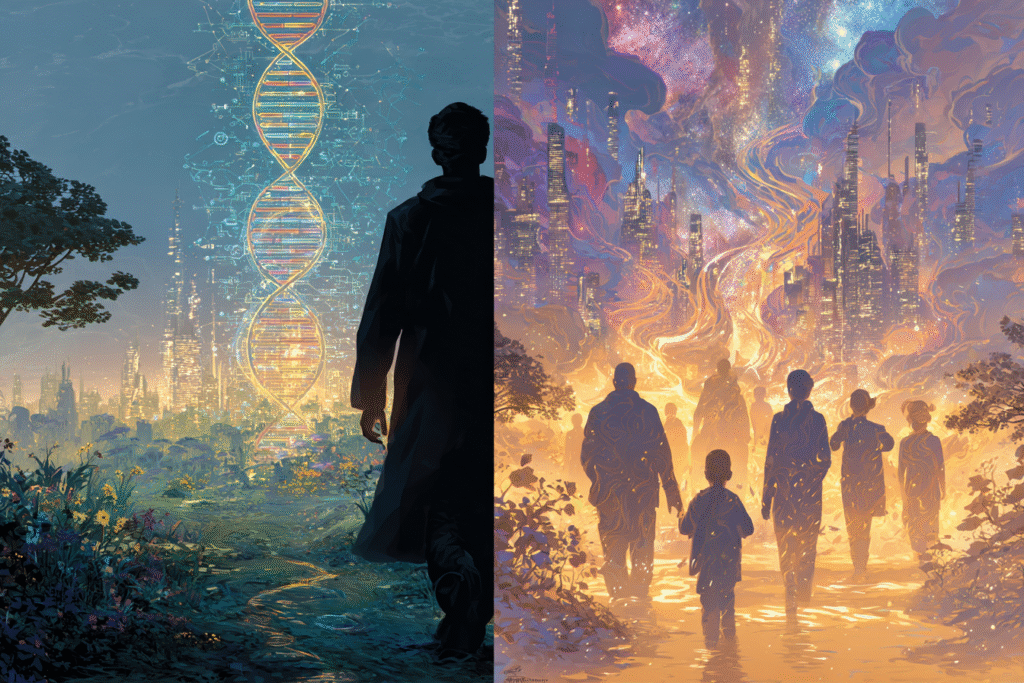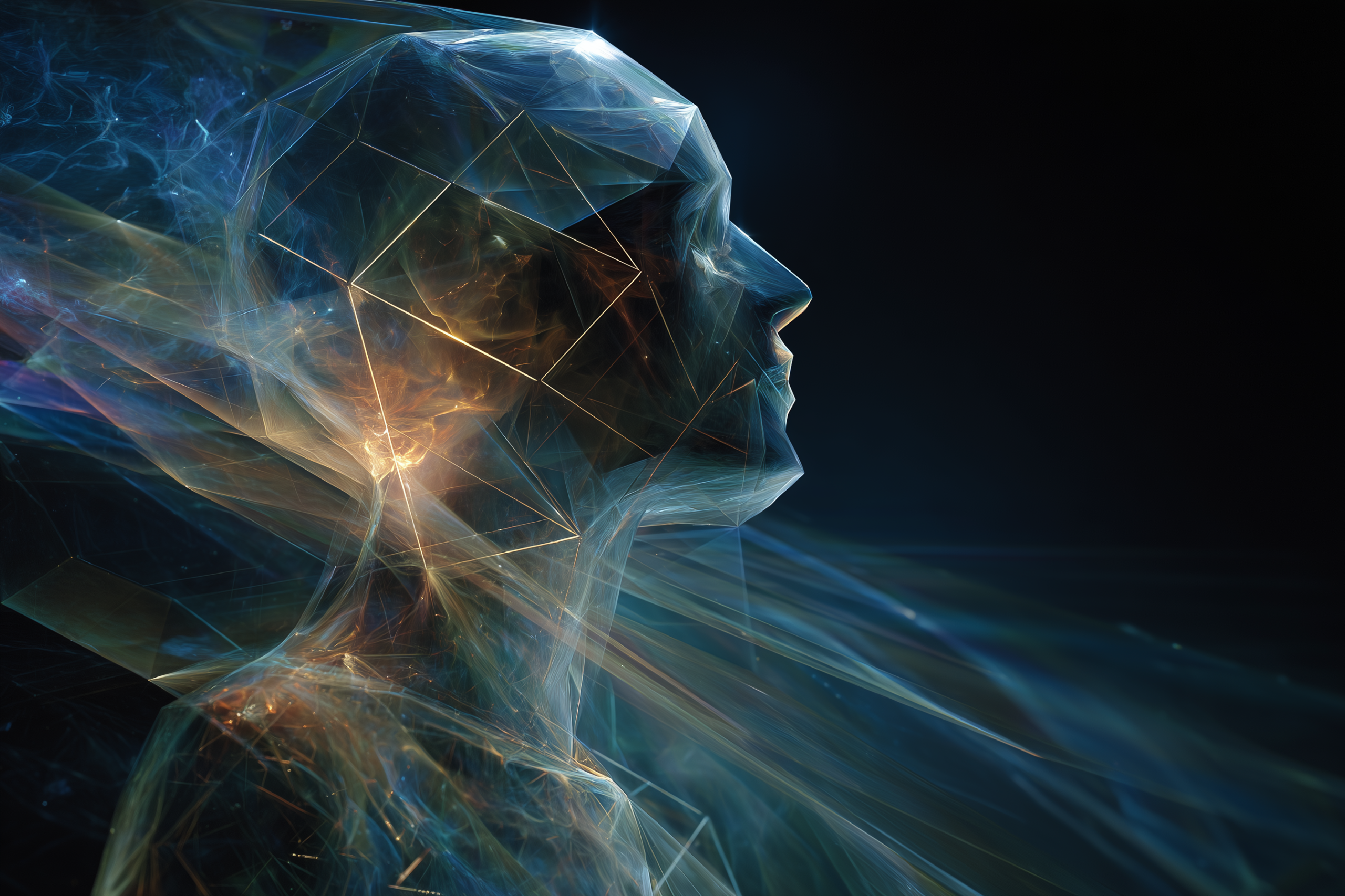The 20th century cured disease. The 21st will make it obsolete, because health isn’t something we fix, it’s something we are.
Note: This article is for educational and informational purposes only. See full disclaimer at the end.
One hundred days. Fifty-four articles on health. Not because health is everything, but because without it, nothing else matters.
We stand at an extraordinary inflection point.
The convergence of artificial intelligence, quantum biology, precision medicine, and our evolving understanding of consciousness itself promises to transform human health more in the next century than in all of human history combined.
But here’s what most futurists miss: the revolution won’t come from technology alone. It will come from a fundamental shift in how we think about health itself—from something we fix when broken to something we cultivate across generations.

The Road We've Traveled
Over these past 54 articles, we’ve explored a paradox: we live in the most medically advanced era in history, yet we’re sicker than ever [10]. We’ve dissected how measurement became addiction, how AI transformed from tool to partner, how meditation rewired neural pathways, and how longevity science shifted from fantasy to frontier.
But more importantly, we’ve seen how individual transformation ripples outward. Every person who shifts from crisis management to proactive health becomes a node in a network of change. Every parent who models healthy behaviors alters their children’s epigenetic inheritance [3]. Every community that prioritizes wellbeing over mere survival plants seeds for generations they’ll never meet.
This isn’t poetry. It’s biology.
The Three Revolutions Converging
The Precision Revolution
By 2050, medicine will no longer treat the average patient because the average patient will no longer exist [1]. AI and precision medicine are converging to create healthcare so personalized that your treatment plan will be as unique as your fingerprint. But here’s the radical part: this isn’t just about better drugs or smarter diagnostics. It’s about understanding health as an emergent property of countless interactions—genetic, epigenetic, microbiomic, environmental, behavioral, and social.
Imagine walking into a clinic where AI has already analyzed your complete biological history, predicted your health trajectory for the next decade, and prepared interventions tailored not just to your genome but to your lifestyle, your stress patterns, your sleep quality, and even your social connections. This isn’t science fiction—early versions exist today in research hospitals [13].
The shift from population-based to truly personalized medicine means we’ll stop asking “What works for most people?” and start asking “What works for you, specifically, at this moment in your life?”

The Quantum Biology Revolution
For decades, biology ignored quantum mechanics, assuming living systems were too warm and chaotic for quantum effects to matter. We were spectacularly wrong [6].
Quantum processes aren’t just present in biology—they’re fundamental to it. Photosynthesis achieves near-perfect efficiency through quantum coherence. Birds navigate using quantum entanglement. Your sense of smell may depend on quantum tunneling [7]. And perhaps most remarkably, consciousness itself may emerge from quantum processes in microtubules within neurons.
What does this mean for the next century of health? Everything. When we understand health at the quantum level, we can intervene at the quantum level. Diseases that seem intractable at the molecular scale may be elegantly solvable at the quantum scale. Cancer cells that resist every drug might be vulnerable to quantum interventions that collapse their abnormal superpositions [16].
By 2100, quantum medicine won’t just treat disease—it will optimize the quantum coherence of biological systems, enhancing everything from cellular energy production to cognitive function. We’re not just going to cure disease; we’re going to optimize the fundamental physics of life itself.
The Consciousness Revolution
Here’s the revolution hiding in plain sight: consciousness isn’t just along for the ride in your health journey—it’s driving [15]. The mind-body connection isn’t metaphorical; it’s measurably, demonstrably real. Your thoughts alter your gene expression. Your beliefs influence your immune system. Your sense of purpose affects how long you live.
The next century will see the full integration of consciousness into medicine. Not as an afterthought or alternative approach, but as a primary intervention. We’ll use AI not just to analyze your blood work but to map your psychological patterns. We’ll prescribe meditation protocols as precisely as medications. We’ll treat depression not just with pills but with targeted interventions that restore the brain’s natural oscillatory patterns.
Most radically, we’ll recognize that health isn’t individual—it’s collective. Your health affects everyone around you through mechanisms we’re only beginning to understand. Social networks transmit health behaviors as surely as they transmit viruses [2]. The consciousness revolution means understanding that healing happens not just in bodies but in relationships, communities, and cultures.

The Generational Gift
Every health choice you make today encodes itself into your biology and potentially the biology of your descendants. This isn’t guilt—it’s power. Epigenetic inheritance means that the exercise you do, the stress you manage, the nutrition you choose, all potentially influence not just your children but your grandchildren and beyond [4].
Think about that. Your morning walk might affect the cardiovascular health of a great-grandchild you’ll never meet. Your decision to prioritize sleep could influence the mental health of descendants born in 2150. This is the true meaning of that ancient wisdom: “The one who plants trees knowing that he or she will never sit in their shade, has at least started to understand the meaning of life.”
But epigenetic inheritance works both ways. Trauma can echo through generations, as we’ve seen in studies of Holocaust survivors and their descendants. Environmental toxins can alter germline epigenetics, affecting fertility and health three generations forward [5]. The choices of previous generations—their exposures, their traumas, their triumphs—live on in our cells today.
This knowledge transforms health from a personal concern to a sacred trust. We’re not just taking care of ourselves; we’re stewarding the biological inheritance of our species.
The Technologies Transforming Tomorrow
AI as Lifelong Partner
By 2050, AI won’t just diagnose disease—it will be your lifelong health companion [12]. From birth, an AI system will learn your patterns, predict your vulnerabilities, and guide your optimization. It will know you’re getting sick before you feel symptoms. It will detect cancer while it’s still a handful of abnormal cells. It will predict your heart attack risk not just years but decades in advance.
But the real revolution isn’t in what AI knows—it’s in how it helps you change. Future AI won’t just tell you to exercise; it will understand your psychology well enough to motivate you specifically. It will design interventions that work with your personality, not against it. It will be a mirror that shows not just who you are but who you could become.

The Quantum Leap
Quantum computers will solve biological problems that would take classical computers longer than the age of the universe [9]. Drug discovery that takes decades today will take months. Protein folding problems that baffle our best minds will be trivial. We’ll simulate entire biological systems at the quantum level, understanding disease not as breakdown but as decoherence.
By 2075, quantum sensors in your bloodstream will detect single molecules of disease markers. Quantum encryption will make your medical data unhackable. Quantum therapies will restore coherence to diseased tissues. We’re not just adding quantum tools to medicine; we’re recognizing that medicine is quantum.
The Biological Reset
Gene editing, starting with CRISPR and evolving far beyond, will make inherited disease obsolete [14]. But the real revolution isn’t fixing broken genes—it’s optimizing healthy ones. By 2100, we’ll tune our genetics like instruments, enhancing everything from muscle growth to cognitive function to emotional resilience.
Regenerative medicine will make aging optional for many tissues. Organs will be grown from your own cells, eliminating rejection and shortage. Nanomachines will patrol your bloodstream, fixing damage before it accumulates [17]. The human body will become upgradeable, repairable, optimizable.
But with great power comes great responsibility. Who decides what’s an improvement? How do we prevent a genetic divide between the enhanced and unenhanced? These aren’t future questions—they’re questions we must answer now, while we still can.

The Challenges We Must Face
The Equity Crisis
The technologies that could democratize health might instead create unprecedented inequality [8]. If precision medicine requires massive data and computational power, will it only be available to the wealthy? If life extension becomes possible, who gets to live longer? If cognitive enhancement becomes real, do we create a species divide?
These aren’t technological problems—they’re choices. We can design systems that democratize health advances or ones that concentrate them. We can ensure that the health revolutions of the next century benefit all of humanity, or we can allow them to become another form of inequality. The choice is ours, and we’re making it right now through the policies we support, the research we fund, and the systems we build.
The Climate Catalyst
Climate change isn’t just an environmental crisis—it’s a health crisis [11]. By 2050, heat waves alone could account for 1.6 million annual deaths. Vector-borne diseases will spread to new regions. Food systems will destabilize. Mental health impacts will cascade through displaced populations.
But here’s the opportunity hidden in the crisis: the same transformation needed to address climate change—moving to plant-based diets, active transportation, cleaner air—also produces massive health benefits. The path to planetary health and human health is the same path. We don’t have to choose between saving ourselves and saving the planet; they’re the same project.

The Meaning Crisis
As we extend life, enhance capabilities, and eliminate diseases, we face a paradox: what’s the point of living longer if we don’t know why we’re living at all? The next century’s health crisis might not be physical but existential. Depression and anxiety already plague developed nations despite material abundance. What happens when we can live to 150 but don’t know what to do with 75?
This is why the consciousness revolution matters. Health isn’t just about biological optimization—it’s about meaning, purpose, connection. The technologies that extend life must be matched by wisdom about how to live. We need not just medical advances but philosophical ones, not just longer lives but deeper ones.
The Vision: Health as Emergence
Imagine stepping into 2125. Disease as we know it—sudden, devastating, irreversible—is largely extinct. Health isn’t something you have but something you cultivate, moment by moment, choice by choice. Your body is in constant dialogue with AI systems that understand you better than you understand yourself. Quantum therapies maintain the coherence of your biological systems. Your genes have been edited not for perfection but for resilience.
But the real transformation isn’t technological—it’s conceptual. Health is understood not as the absence of disease but as the presence of vitality. Medicine doesn’t wait for breakdown but maintains optimization. Healthcare isn’t a service you receive but a practice you embody.
Communities are designed for wellbeing. Cities prioritize walkability and green space. Workplaces optimize for human flourishing, not just productivity. Schools teach emotional regulation alongside mathematics. Governments measure success not by GDP but by the health span of their citizens.
Most remarkably, humanity has remembered what indigenous cultures never forgot: health is relational. Your wellbeing is inseparable from your community’s wellbeing, from your ecosystem’s wellbeing, from the planet’s wellbeing. The sharp lines we drew between self and other, human and nature, individual and collective, have dissolved into a more accurate understanding of interdependence.
The Choice Before Us
None of this is inevitable. The next century of health could instead be a nightmare of inequality, where the rich live to 200 while the poor die at 50. Where genetic enhancement creates a new caste system. Where climate change triggers health catastrophes that make COVID-19 look trivial. Where the meaning crisis deepens into species-wide despair despite biological optimization.
The difference between utopia and dystopia isn’t technology—it’s choice. Every decision we make today about healthcare access, research priorities, data privacy, and human enhancement shapes the trajectory of the next century. We’re not passengers on this journey; we’re pilots.
And this brings us back to you, reading this on Day 100 of a 162-day journey. Your health choices matter not just for you but for everyone you influence, directly and indirectly, consciously and unconsciously. Your transformation ripples outward through space and forward through time in ways you’ll never fully know.

The Call to Action
So here’s the challenge, the invitation, the opportunity: stop thinking about your health as your personal project and start thinking about it as your generational gift. Not because you should feel guilty about that cookie or proud of that workout, but because you’re part of something magnificent—the great human experiment in conscious evolution.
The next century of health won’t be created by scientists and technologists alone. It will be created by millions of individuals making billions of choices that slowly, steadily, irreversibly shift the trajectory of our species. Every time you choose vitality over mere survival, every time you model healthy behaviors for others, every time you advocate for equitable healthcare, you’re helping to write the next chapter of human health.
Your children and grandchildren won’t just inherit your genes—they’ll inherit the world your choices help create.
The question isn’t whether you’ll influence the future of human health. You will, inevitably, through action or inaction, engagement or withdrawal. The only question is: will you do it consciously?
The tree you plant today—through your habits, your advocacy, your example—will provide shade for generations you’ll never meet.
But unlike our ancestors who could only plant physical trees, you can plant behavioral patterns, social norms, and epigenetic potentials that could flourish for centuries.
This is the profound responsibility and incredible opportunity of being alive at this moment in history. We’re the bridge generation—the ones who remember life before AI, who witnessed the dawn of precision medicine, who stand at the threshold of the quantum biology revolution. What we do in the next few decades will echo for centuries.
The next century of human health starts now. It starts with your next choice. It starts with recognizing that health isn’t something you have but something you create, not just for yourself but for all of us, not just for today but for tomorrow’s tomorrow.
Welcome to Day 100. The future is watching. What will you choose?
See you in the next insight.
Comprehensive Medical Disclaimer: The insights, frameworks, and recommendations shared in this article are for educational and informational purposes only. They represent a synthesis of research, technology applications, and personal optimization strategies, not medical advice. Individual health needs vary significantly, and what works for one person may not be appropriate for another. Always consult with qualified healthcare professionals before making any significant changes to your lifestyle, nutrition, exercise routine, supplement regimen, or medical treatments. This content does not replace professional medical diagnosis, treatment, or care. If you have specific health concerns or conditions, seek guidance from licensed healthcare practitioners familiar with your individual circumstances.
References
The references below are organized by study type. Peer-reviewed research provides the primary evidence base, while systematic reviews synthesize findings.
Peer-Reviewed / Academic Sources
- [1] Johnson, A.M. et al. (2020). Precision Medicine, AI, and the Future of Personalized Health Care. PMC. https://pmc.ncbi.nlm.nih.gov/articles/PMC7877825/
- [2] Heard, E. & Martienssen, R.A. (2014). Transgenerational Epigenetic Inheritance: myths and mechanisms. PMC. https://pmc.ncbi.nlm.nih.gov/articles/PMC4020004/
- [3] Franklin, T.B. et al. (2013). Epigenetic Inheritance of Disease and Disease Risk. PMC. https://pmc.ncbi.nlm.nih.gov/articles/PMC3521963/
- [4] Nilsson, E.E. et al. (2022). Role of epigenetic transgenerational inheritance in generational toxicology. PMC. https://pmc.ncbi.nlm.nih.gov/articles/PMC8848501/
- [5] Sales, V.M. et al. (2023). Epigenetic Inheritance and Transgenerational Environmental Justice. PMC. https://pmc.ncbi.nlm.nih.gov/articles/PMC10303257/
- [6] Matta, G. (2023). It’s Time to Go Quantum in Medicine. PMC. https://pmc.ncbi.nlm.nih.gov/articles/PMC10342414/
- [7] Kumar, S. et al. (2023). The Quantum-Medical Nexus: Understanding the Impact of Quantum Technologies on Healthcare. PMC. https://pmc.ncbi.nlm.nih.gov/articles/PMC10689891/
- [8] Watkins, D.A. et al. (2024). Global health 2050: the path to halving premature death by mid-century. The Lancet. https://www.thelancet.com/journals/lancet/article/PIIS0140-6736(24)01439-9/abstract
Government / Institutional Sources
- [9] Oxford Academic. (2024). A primer for quantum computing and its applications to healthcare and biomedical research. Journal of the American Medical Informatics Association. https://academic.oup.com/jamia/article/31/8/1774/7700020
- [10] Institute for Health Metrics and Evaluation. Forecasting the state of world health in 2050. IHME. https://www.healthdata.org/news-events/podcasts/forecasting-state-world-health-2050
- [11] World Economic Forum. (2024). These 3 climate events will impact health the most by 2050. https://www.weforum.org/stories/2024/01/climate-change-health-impact-mortality/
Industry / Technology Sources
- [12] Bajwa, J. et al. (2021). Artificial intelligence in healthcare: transforming the practice of medicine. PMC. https://pmc.ncbi.nlm.nih.gov/articles/PMC8285156/
- [13] Ardigen. (2025). AI, Precision Medicine & the Future: Key Insights from PMWC 2025. https://ardigen.com/ai-precision-medicine-the-future-key-insights-from-pmwc-2025/
- [14] Al-Eyadhy, A. et al. (2023). Revolutionizing healthcare: the role of artificial intelligence in clinical practice. BMC Medical Education. https://bmcmededuc.biomedcentral.com/articles/10.1186/s12909-023-04698-z
- [15] Harvard Gazette. (2025). How AI is transforming medicine. https://news.harvard.edu/gazette/story/2025/03/how-ai-is-transforming-medicine-healthcare/
- [16] Herald Scholarly Open Access. Towards Quantum Medicine. https://www.heraldopenaccess.us/openaccess/towards-quantum-medicine
- [17] Interesting Engineering. (2025). Life in 2050: A Glimpse at Medicine in the Future. https://interestingengineering.com/innovation/life-in-2050-a-glimpse-at-medicine-in-the-future


